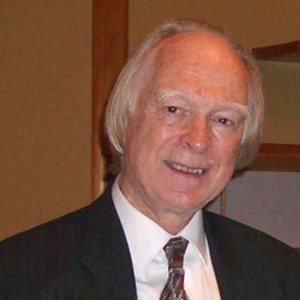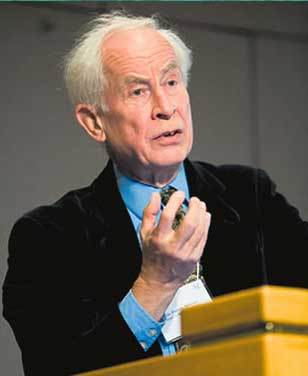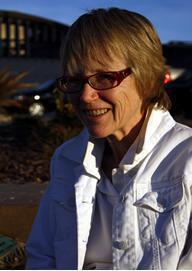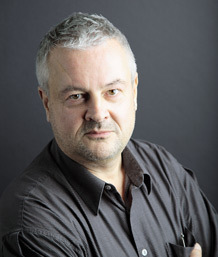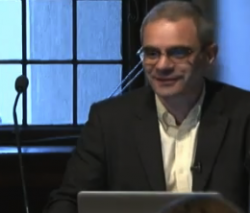While principal organizers of the upcoming Royal Society meeting on a paradigm shift to a more sublime evolutionary synthesis are mum about exactly who's invited to speak, I've compiled a list of likely presenters -- which follows -- based on a range of sources. The meeting scheduled for November 7-9 is a public one, co-sponsored by the British Academy for the humanities and social sciences.
Prime movers of the event are: Oxford physiologist and Royal Society Fellow, Denis Noble -- who has already made his case on this page for replacing the modern synthesis; Sir Patrick Bateson, FRS, who was knighted by Queen Elizabeth in 2003 for his service to biology and currently serves as president of the Zoological Society of London; Nancy Cartwright, Lady Hampshire, a University of Durham/University of California-San Diego philosopher of science and Fellow of the British Academy; John Dupré, a philosopher of biology at the University of Exeter whose interest is in the "processes of life" and their relevance to society; and Kevin Laland, whose research focus at the University of St. Andrews is animal behavior (humans included) and evolution.
Cartwright and Dupré are associated with the Stanford School of Philosophy of Science that argues against the unity of science. Laland is an ally of some of "the Altenberg 16" scientists listed on The Third Way of Evolution page -- Gerd Müller, Eva Jablonka and John Odling-Smee, who until recently had been thinkng an extended synthesis was enough, i.e., a grafting onto the modern synthesis. However, their recent paper indicates that the extended synthesis they once envisioned could now be more along the lines of what Denis Noble is arguing for -- replacement.
The other Altenberg 16 name associated with The Third Way of Evolution page -- which many of the scientists attending the upcoming conference are part of -- is cell biologist Stuart Newman. Newman gave me his perspective recently on what he termed the "new thinking":
"Nonlinear means that you can't look at straight lines of descent anymore because viruses and other entities are coming in at all stages of evolution. Classically this -- horizontal transfer -- has been considered a rare thing. With the new understanding of what viruses can do, the nonlinear approach becomes much more prominent.
The idea is that when you look at the early history of life and the origin of the cell, you really can't track linearly from primitive form through changes in the genome to later forms because entities are now understood to be coming in laterally from other forms. It's new thinking and I have no disagreement with it."
But a source familiar with the proposal submitted to the British Academy regarding the Royal Society event was measured in their assessment of the upcoming meeting, characterizing it as "conservative," one that will largely address "process," i.e., developmental biology.
So will the November gathering actually go all the way in recommending neo-Darwinism be replaced? Clearly, the answer depends on the list of invited speakers. Names of the 20 or so presenters will be officially announced by the Royal Society shortly. Hopefully, the outcome of the meeting will also be influenced by audience participation.
Reservations to attend the meeting are "first come, first served." Registration is now open (no registration fee). The last time I checked, there were still roughly 260 seats available in the room.
As yet, there are no plans to stream proceedings over the Internet during the event, making it possible for those unable to attend to ask questions. WHY NOT? Surely the oldest scientific society in the world has the technical know-how to make such arrangements. So far the Royal Society has only indicated that it will post talks online following the event.
Here is my projected lineup of event speakers (partial list):
Patrick Bateson
Nancy Cartwright
Terrence Deacon
John Dupré
Scott Gilbert
Mae-Wan Ho
Eva Jablonka
Michael Joyner
Evelyn Fox Keller
Kevin Laland
Armin Moczek
Gerd Müller
Stuart Newman
Denis Noble
John Odling-Smee
Peter Saunders
James Shapiro
I was informed by the Royal Society science program office that there will be no formal presentations on viruses, per se, which seems peculiar considering viruses are now understood to be the biggest part of the biosphere, and a key reason for paradigm shift. Viruses and microbes -- both organisms -- were left out of the modern synthesis.
Seriously missing then from the proceedings will be Paradigm Shifters and virus specialists/enthusiasts: Eugene Koonin, Luis Villarreal, Ricardo Flores, František Baluška, Corrado Spadafora, Günther Witzany and Eibi Nevo.
Nigel Goldenfeld, long-time collaborator of Carl Woese, will also not be there. Goldenfeld and his team have been investigating the origin and evolution of life since 2012, funded by NASA. Goldenfeld thinks we need a theory of life. He's told me this:
"The Modern Synthesis doesn't address and doesn't claim to address issues of how do living systems even arise in the first place and how do you account for the very existence of life as a phenomenon."
Other Paradigm Shifters -- Adrian Bejan, Jonathan Delafield-Butt and David Edelman -- are likely to attend. It is unclear if Kalevi Kull and the school of biosemiotics will be presenting. Lynn Margulis and Carl Woese will be forever missed at such gatherings.
Royal Society president Venkatraman Ramakrishnan will not be a speaker, but I would be surprised if both Venki Ramakrishnan and his predecessor, Paul Nurse did not drop in.
Will Richard Dawkins and Jerry Coyne be among the invited speakers, to defend the selfish gene? We will soon find out. . .
Meanwhile, there are some concerns that the meeting could be a rehash of Altenberg. And so a parallel meeting in London is being discussed, on the order of the "Open Questions" sessions biochemist Pier Luigi Luisi has organized in the past, most recently at 2014 ISSOL (International Society for the Study of the Origin of Life). More as that story develops. . .

